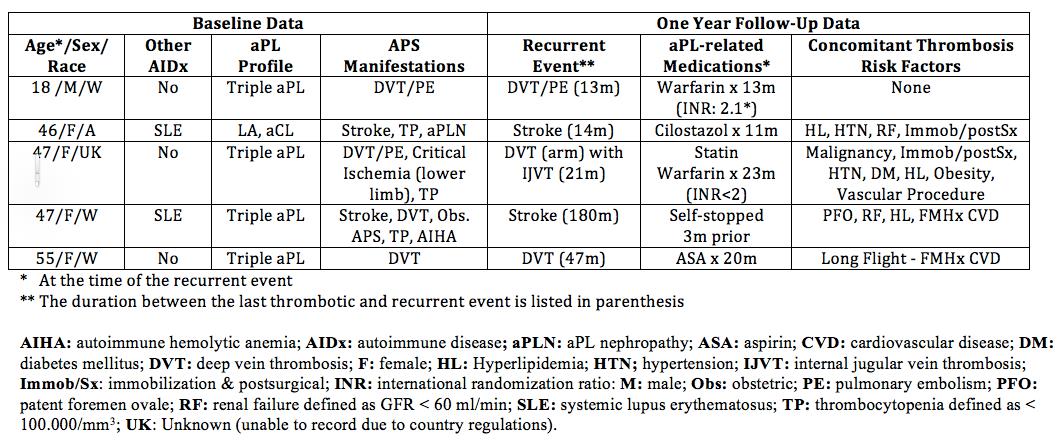Session Information
Session Type: ACR Poster Session C
Session Time: 9:00AM-11:00AM
Background/Purpose: APS ACTION “Registry” was
created to study the natural course of disease over 10 years in persistently
antiphospholipid antibody (aPL)-positive patients with/without other systemic
autoimmune diseases. Given that risk-stratified prospective data on the first
or recurrent thrombosis risk in persistently aPL-positive patients are limited
and controversial, our objective was to describe the thrombotic events
identified during the follow-up of APS ACTION “Registry” patients, and also to determine
the one-year first and recurrent thrombosis risk.
Methods: A web-based data capture system
is used to store patient demographics, aPL-related history, and medications.
The inclusion criteria are positive aPL (lupus anticoagulant test [LA], anticardiolipin
antibody [aCL], and/or anti-β2Glycoprotein-I antibody [aβ2GPI])
based on the Updated Sapporo Classification Criteria at least twice within one
year prior to enrollment. Patients are followed every 12±3 months with clinical
data and blood collection; they also receive advice on cardiovascular disease
and thrombosis prevention at each visit. In this descriptive analysis, patients
who completed their one year follow-up visits are included.
Results: Of 581 patients included in the APS
ACTION Registry, 350 (60%) completed their one year follow-up visits as of June
2015 (aPL/APS without any other autoimmune disease: 241 [no thrombosis: 35;
thrombotic APS: 148; obstetric APS: 24; and thrombotic & obstetric APS:
34]; and aPL/APS associated with another autoimmune disease: 109 [no
thrombosis: 45; thrombotic APS: 42; obstetric APS: 10; and thrombotic &
obstetric APS: 12]). Table demonstrates the demographic, clinical, and
laboratory characteristics of patients who had new events during the one year follow-up.
Based on five new thrombotic events, the incident thrombosis risk was 1.7% and 0%
per year in patients with and without history of thrombosis, respectively.
Conclusion: The one year incident thrombosis
risk is relatively low and commonly associated with triple aPL-positivity as
well as non-aPL thrombosis risk factors in our multi-center international cohort.
Annual and risk stratified analysis of APS ACTION registry will better determine
the risk of thrombosis in persistently aPL-positive patients based on different
risk profiles.
To cite this abstract in AMA style:
Erkan D, Zuily S, Banzato A, De Ceulaer K, Cohen H, Tektonidou M, Andrade D, . OBOAA. Antiphospholipid Syndrome Alliance for Clinical Trials and International Networking Clinical Database and Repository (“Registry”) Prospective Follow-up Analysis: One-Year First and Recurrent Thrombosis Risk [abstract]. Arthritis Rheumatol. 2015; 67 (suppl 10). https://acrabstracts.org/abstract/antiphospholipid-syndrome-alliance-for-clinical-trials-and-international-networking-clinical-database-and-repository-registry-prospective-follow-up-analysis-one-year-first-and-recurrent-thrombosi/. Accessed .« Back to 2015 ACR/ARHP Annual Meeting
ACR Meeting Abstracts - https://acrabstracts.org/abstract/antiphospholipid-syndrome-alliance-for-clinical-trials-and-international-networking-clinical-database-and-repository-registry-prospective-follow-up-analysis-one-year-first-and-recurrent-thrombosi/

